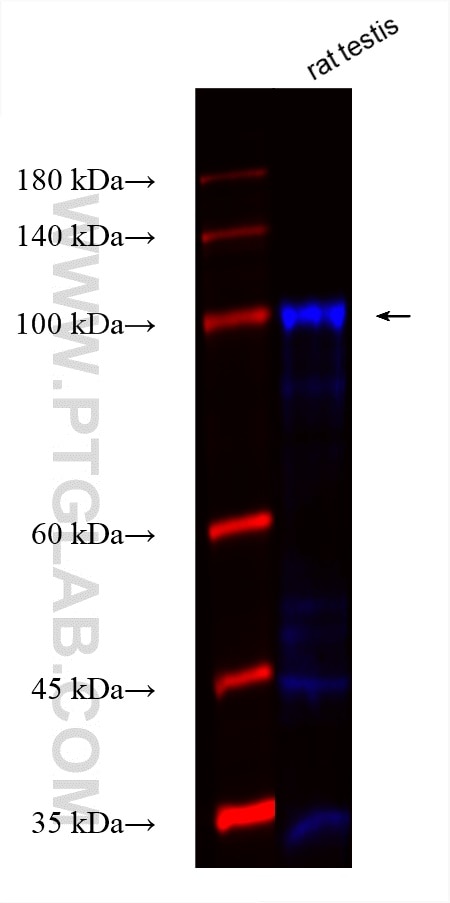Tested Applications
| Positive WB detected in | rat testis tissue |
Recommended dilution
| Application | Dilution |
|---|---|
| Western Blot (WB) | WB : 1:1000-1:4000 |
| It is recommended that this reagent should be titrated in each testing system to obtain optimal results. | |
| Sample-dependent, Check data in validation data gallery. | |
Product Information
CL750-82986 targets AKAP3 in WB applications and shows reactivity with human, mouse, rat samples.
| Tested Reactivity | human, mouse, rat |
| Host / Isotype | Rabbit / IgG |
| Class | Recombinant |
| Type | Antibody |
| Immunogen | AKAP3 fusion protein Ag33655 Predict reactive species |
| Full Name | A kinase (PRKA) anchor protein 3 |
| Calculated Molecular Weight | 95 kDa |
| Observed Molecular Weight | 100 kDa |
| GenBank Accession Number | BC047535 |
| Gene Symbol | AKAP3 |
| Gene ID (NCBI) | 10566 |
| RRID | AB_3673758 |
| Conjugate | CoraLite® Plus 750 Fluorescent Dye |
| Excitation/Emission Maxima Wavelengths | 755 nm / 780 nm |
| Form | Liquid |
| Purification Method | Protein A purification |
| UNIPROT ID | O75969 |
| Storage Buffer | PBS with 50% Glycerol, 0.05% Proclin300, 0.5% BSA, pH 7.3. |
| Storage Conditions | Store at -20°C. Avoid exposure to light. Stable for one year after shipment. Aliquoting is unnecessary for -20oC storage. |
Background Information
AKAP3 is a member of A-kinase anchoring proteins (AKAPs), a family of functionally related proteins that target protein kinase A to discrete locations within the cell. AKAP3 is reported to participate in protein-protein interactions with the R-subunit of the protein kinase A as well as sperm-associated proteins. AKAP3 is expressed in spermatozoa and localized to the acrosomal region of the sperm head as well as the length of the principal piece. It may function as a regulator of motility, capacitation, and the acrosome reaction.
Protocols
| Product Specific Protocols | |
|---|---|
| WB protocol for CL Plus 750 AKAP3 antibody CL750-82986 | Download protocol |
| Standard Protocols | |
|---|---|
| Click here to view our Standard Protocols |



